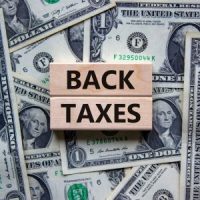What Can I Do About Back Taxes?

Many people falsely believe they don’t have to do anything about back taxes. The overall audit rate is less than 1 percent (the audit rate for high-earning taxpayers is significantly higher). So, quite frankly, many people think they can owe back taxes and the IRS won’t do anything about it.
The formal audit rate has plummeted in recent years, but the informal audit rate remains much the same. These audits usually begin with a dreaded “Dear Taxpayer” letter that demands additional tax forms or supporting financial information.
The IRS’ structure has largely remained unchanged as well, especially in terms of its legal authority. The IRS is, by far, the world’s largest collection agency. It can garnish wages, freeze bank accounts, and take other such drastic actions without obtaining court orders.
So, if you owe back taxes, you need to take action. Usually, the first step is reaching out to a Chicago back taxes lawyer. Several bankruptcy and non-bankruptcy payment plans and back tax forgiveness programs are available. Only a lawyer helps you choose the right one for you and your family.
Discharge and Repayment Through Bankruptcy
The Automatic Stay may be the best reason to file bankruptcy on back taxes. Section 362 of the Bankruptcy Code protects taxpayers in the short term and the long term.
As mentioned, the IRS has almost limitless collection authority. The Automatic Stay stops these processes in their tracks. Even if an IRS tax sale is scheduled for tomorrow, a Chicago back taxes lawyer can stop that sale today.
It’s relatively easy to stop adverse proceedings before they begin. But it’s almost impossible to undo them. So, if you owe back taxes, we urge you to contact us now, because the IRS is lurking in the bushes.
Next, as the case proceeds, the Automatic Stay usually prohibits the IRS from adding penalties and interest to the UPB (unpaid principal balance). In many cases, these add-on fees exceed the UPB amount.
Past-due income taxes are priority unsecured debts which are dischargeable in some situations. The discharge rule for past-due income taxes in customer bankruptcy proceedings are:
- Taxes are at least three years old,
- Returns have been on file at least two years, and
- Debt hasn’t been assessed (calculated in a certain way) in the last 240 days.
Consumers who don’t meet the discharge rules are usually eligible for repayment in a Chapter 13. This kind of bankruptcy gives taxpayers up to five years to pay back delinquent priority unsecured debts.
Fresh Start Alternatives
Repayment plans are the most common form of IRS Fresh Start Program relief, followed by offer in compromise and inability to pay.
Most taxpayers are eligible for repayment plans, if they can pay enough each month to pay off the UPB before the statute of limitations expires (ten years). A Chicago back taxes lawyer helps taxpayers calculate a monthly payment that retires the debt quickly, avoiding the accumulation of penalties and interest, and also gives them some wiggle room during periods of economic hardship.
Offer in compromise and inability to pay are closely related. The IRS can accept or reject an offer in compromise, usually based on the amount due and the taxpayer’s ability to pay. A Chicago back taxes lawyer is a valuable negotiation partner in these cases. Inability to pay may be an option if the taxpayer has zero assets. By that, we mean no house, no car, no 410(k), and no nothing.
Count on a Detail-Oriented Cook County Lawyer
No matter what kind of financial problem you are having, bankruptcy could be a way out. For a confidential consultation with an experienced back taxes lawyer in Chicago, contact the Bentz Holguin Law Firm, LLC. We routinely handle matters throughout the Prairie State.
Source:
trac.syr.edu/reports/706/


